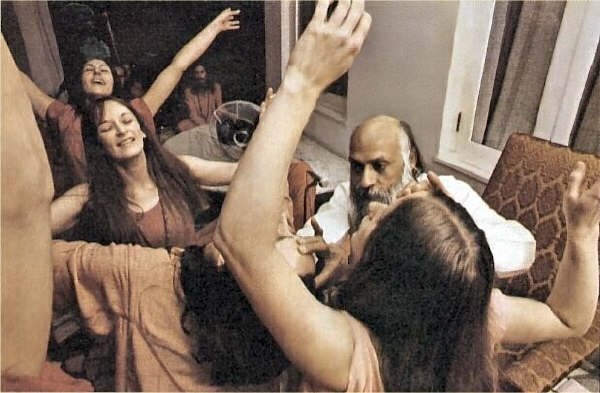IN THE BEGINNING WAS THE WORD, AND THE WORD WAS WITH GOD, AND THE WORD WAS GOD.
IN THE BEGINNING WAS THE WORD.
What does it mean when the gospel says IN THE BEGINNING?
Christians have been interpreting it as if IN THE BEGINNING means that there was a beginning. They have been using and interpreting these words 'IN THE BEGINNING' as if they show something about the beginning of time. But without time how can there be a beginning? To begin, time will be needed in the first place. If time was not in existence, then what do you mean by IN THE BEGINNING?
IN THE BEGINNING is part of time and cannot precede time, so IN THE BEGINNING does not mean that there was a day when God created the world. That's absolutely foolish.
IN THE BEGINNING is just a way of talking. IN THE BEGINNING does not mean in the beginning at all, because there has never been a beginning — and there can be no end. God is eternal, His creativity is eternal. It has always been so and it will always be so.
Because of these words 'IN THE BEGINNING' much controversy has continued for centuries. There have even been foolish priests and bishops who have tried to fix the exact date: four thousand four years before Christ, on a certain Monday, the world started. And what was God doing before that?
Eternity must have preceded it — four thousand years is nothing. What was he doing before that? Not doing anything at all? Then why suddenly on a certain date did he start the Creation?
It has been a problem, but the problem arises because of a wrong interpretation. No, IN THE BEGINNING is just a way of speaking. One has to start from somewhere, the gospel has to begin from somewhere.
Life is eternity, life never starts from anywhere, but every story has to start and every scripture has to start. Arbitrarily they have to choose a certain word and you could not choose better: IN THE BEGINNING. IN THE BEGINNING simply says that we don't know.
But from the very beginning, if there was any beginning, God has been creative.
Let me try to say it in a different way: God is creativity. You can even drop the word 'God'. In fact the gospel itself does not want to use the word 'God'.
IN THE BEGINNING WAS THE WORD, AND THE WORD WAS WITH GOD, AND THE WORD WAS GOD.
IN THE BEGINNING WAS THE WORD. What word are you talking about, what is this word?
Somebody who has known truth knows well that to name God is futile: there is no name, no definition — and all words are small, they cannot contain the whole.
THE WORD is again simply a way of indicating the nameless, the unknown.
IN THE BEGINNING WAS THE WORD.
Jews, who preceded Jesus, of whom Jesus was the very culmination…. The Judaic spirit came to a fulfillment in Jesus. Of course they denied Jesus; that is another story.
Sometimes it happens that somebody amongst you attains to the fulfillment of the whole race, but the fulfillment is so vast and so great and you are so low that you cannot believe it; you have to deny it.
Christ rose high. Jews had been waiting for centuries for this man — look at the irony! — they had been waiting for centuries for this man to happen, all their hope was with this man who would transform their lives and who would bring the kingdom of God on earth… and then this man happened and they themselves, who had been waiting for him, could not believe, could not trust. What happened?
They became too addicted to waiting itself. "Now, if this is the man, then what will we do?" Then the waiting will have to stop, will have to be stopped. And they had waited so long — in fact, waiting itself had become their whole activity, their whole religious activity: waiting for the son of God to come. And now suddenly this man is there and says, "I am here."
But now they would rather cling to their waiting than look at this man — because to look at this man will be the end; now there is nothing else to wait for. Future disappears, hope disappears, desire disappears. This man will kill all hoping, all desiring, all future — that is too much! The old mind has become addicted to its own waiting, the old mind has become addicted to its own misery, frustration — now it is too much.
It happens: if you have been ill very long, by and by you start having a certain investment in the illness. Then you become afraid — if you become healthy again, fear arises because you will have to go to the office again, to the marketplace. For these few years you have been resting: there has been no anxiety; you could relax.
Now again the responsibility. And not only that — for these few years that you have been ill, everybody has been sympathetic to you, almost everybody tried to love you. You have become the center of your family, friends, acquaintances; everybody has been kind. To move again in the harsh and cruel world: the mind recoils back; it doesn't seem worth it.
If a race has been waiting for too long…. And Jews have always been waiting. They are still waiting — and the man has happened and gone. But they have invested too much in waiting: their waiting has become their prayer, their synagogues are nothing but waiting rooms for the messiah to come. And he has been here!
And I tell you, if he comes again — though I don't think he will commit the same mistake again — if he comes again, Jews still will not accept him, because then what will happen to their waiting? They have lived too much in it; their imprisonment has become their home and they have decorated it. And now to move in the harsh, open sky — where sometimes the sun is burning too much, and sometimes it is raining, and sometimes it is cold or it is hot — it is dangerous. They are sheltered.
IN THE BEGINNING WAS THE WORD…
Jews have been insistently emphasizing that God's name should not be asserted because it is something to keep deep down in the heart. To assert it is to make it profane; to say it is to make it part of the ordinary world and language. To say it again and again is to make it lose its meaning and significance.
If you love somebody and the whole day you say, "I love you, I love you," many times — and you enjoy saying it — in the beginning the other person may be happy, but sooner or later the thing is going to be too much. "I love you, I love you" — you are making a beautiful word useless. Don't use it too much. Then it is significant, then it carries some meaning.
In fact those who are really in love may not use it at all. If the love is not shown by itself it cannot be said — there is no need to say it. And if it is shown by itself, then what is the need to say it? There should be a few key words which you use rarely, very rarely. They should be kept for rare occasions when you touch a peak.
The Jews have always insisted that the name of God should not be taken. It was the custom in the old days, before Christ, that only the High Priest of the Temple of Solomon was allowed to use it — and once a year only. Nobody else was allowed. So THE WORD is the code, the code for God's name. Something has to be used to indicate it and this is a beautiful code: THE WORD. They don't use any words: they simply say: THE WORD. The same has been done in India also. If you ask Sikhs, the followers of Nanak, they will say: NAM, the Name. They don't say any name; they.simply say: the Name. It means the same as THE WORD.
Only the High Priest was allowed, and the High Priest had to purify himself. The whole year he would purify himself and fast and pray and get ready. Then one day in the year the whole community would gather. Then too the High Priest would not utter the word before the crowd: he would move into the innermost shrine of the temple; the doors would be closed. Deep in silence where nobody could hear — the crowd would be waiting outside and there was no possibility for them to hear — he would assert the name in such sanctity, deep love, intimacy. He was asserting the name for the whole community.
It was a blissful day when the name was asserted. Then for the whole year the name was not to be brought to the lips. You have to carry it in the heart; it has to become like a seed. If you bring the seed out of the soil again and again, it will never sprout. Keep it deep down. Water it, protect it, but keep it deep in darkness so that it sprouts, dies and is reborn.
The name of God has to be kept deep in the heart. Even you should not hear it; it should be so deep in your being, in your subliminal depths, that it never even reaches to your own mind. That is the meaning of why the High Priest goes into the innermost shrine.
Nobody hears, the doors are closed, and he asserts the name once. The meaning is this: go into the deepest shrine of your temple of the heart, purify yourself, and once in a while, when you feel the fragrance of your being — when you are at the peak of your energy, when you are really alive and not an iota of sadness lingers around you: you are happy, tremendously happy, ecstatically happy and tranquil and silent, you are in a state where you can thank, where you can feel grateful — then go into the innermost shrine.
Your mind will be left out — that is the crowd. You move deeper in the heart and there you assert so silently that even your mind will not be able to hear it. There, the Word has to be carried.
IN THE BEGINNING WAS THE WORD, AND THE WORD WAS WITH GOD, AND THE WORD WAS GOD.
There is no difference between God and His name. He has no name; He himself is His name. His `is-ness' is His name; His existence is His name. A child is born. What name does he have? — no name. But he is. That `is-ness' is his name. Then, for utilitarian purposes, we give a name to him and by and by he will forget his `is-ness' and he will become identified with the name.
If somebody insults the name, he will be angry; if somebody praises the name, he will be very happy. And the name never belonged to him!
God is the child, always the child, always the innocence of the world. He has no name. That is the meaning of this saying: AND THE WORD WAS WITH GOD. `Is-ness', existence, being: AND THE WORD WAS WITH GOD. His name is His being. Don't repeat His name, move into His being — that is the only way to attain Him. In fact, forget about Him. Move into your own being and `is-ness', and you will attain to Him.
OSHO
(READ FURTHER : Come Follow To You, Vol 1 Chapter #1)



